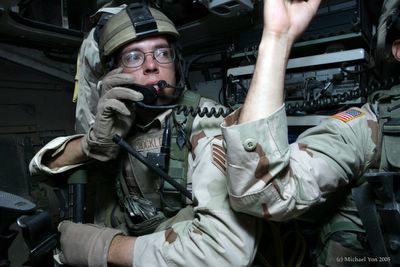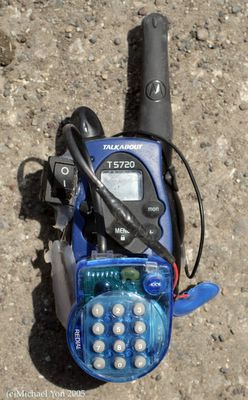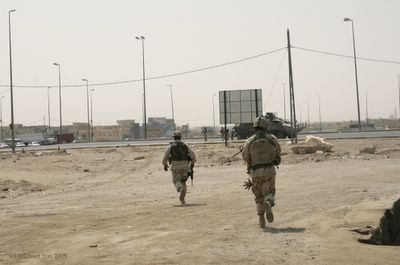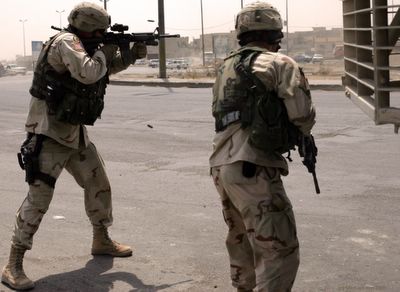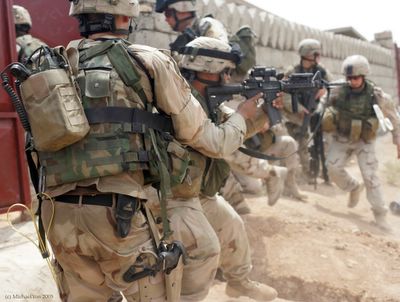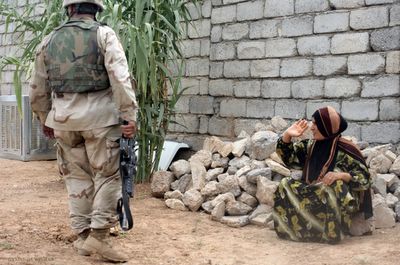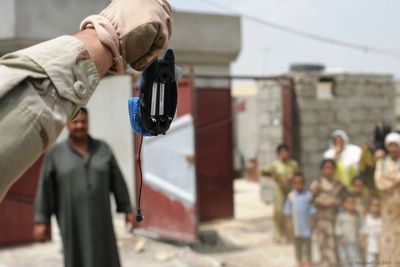Gates of Fire
 The top leaders of the Deuce Four: CSM Robert Prosser and LTC Erik Kurilla making the call to Daniel's Mom outside the hospital
The top leaders of the Deuce Four: CSM Robert Prosser and LTC Erik Kurilla making the call to Daniel's Mom outside the hospitalMosul, Iraq
Combat comes unexpectedly, even in war.
On Monday, while conducting operations in west Mosul, a voice came over the radio saying troops from our brother unit, the 3-21, were fighting with the enemy in east Mosul on the opposite side of the Tigris River. Moments later, SSG Will Shockley relayed word to us that an American soldier was dead. We began searching for the shooters near one of the bridges on our side of the Tigris, but they got away. Jose L. Ruiz was killed in action.
Although the situation in Mosul is better, our troops still fight here every day. This may not be the war some folks had in mind a few years ago. But once the shooting starts, a plan is just a guess in a party dress.
The only mission I've seen unfold close to what was planned was a B Company raid a few months back. It actually went so close to perfect that we could hardly believe it. The sole glitch occurred when a Stryker hit an IED, but since nobody was hurt, we just continued the mission. In retrospect, it's hard to imagine why I didn't write about it. But times are busy, and, apart from it going nearly perfectly according to plan, it just seemed like any other old raid.
I had been talking with Captain Matt McGrew about the "The Battle for Mosul IV" dispatch, intending to spend the night with him and some Iraqi troops at one of their combat outposts, to glean additional insight, but the on-going battles in Mosul kept getting in the way. On the night before the planned ride-along, the obstacle was a big and sudden push of operations and tasks bundled in a "surge operation." Operation Lancer Fury was launched without notice even to the unit commanders here.
When I'd sat in on the "warning order" (notice of impending operations) for Lancer Fury last week, the plan was so cleverly contrived that the leadership at Deuce Four had to grudgingly acknowledge its excellence, even though the idea had originated from higher-up. In every military unit I have seen, there is a prevailing perception that good ideas trickle down from the top about as often as water flows uphill, so Lancer Fury apparently was a wunder-plan.
As a "surge" operation, Lancer Fury is sort of a crocodile hunt, where our people do things to make the crocodiles come out, trying to flush them into predictable directions, or make them take certain actions. And when they do, we nail them. The combat portion of the Surge amounted to a sophisticated "area ambush" that would unfold over the period of about one week.
This Surge is a complicated piece of work, with multidimensional variables and multifarious moving parts. Those parts range literally from boots on our feet to satellites zipping overhead. So, of course, glitches and snags started occurring the first day. Among other things, key gear failed; but overall, the Surge was going well. A few terrorists had already been caught in the first 24 hours.
Thursday night, a revised plan had me following some Deuce Four soldiers on a midnight raid. They had night vision gear, so they moved quickly. I had only moonlight, so I nearly broke my leg keeping up. Sleeking around Mosul under moonlight, we prowled through the pale glow until we came upon a pond near a farmhouse. Recon platoon had already raided one house and snagged some suspects, then crept away in the darkness to another target close by.
Five soldiers from Recon—Holt, Ferguson, Yates, Welch and Ross—were moving through moon-cast shadows when an Iraqi man came out from a farmhouse, his AK-47 rifle hanging by his side. Suddenly encircled by the rifles, lights and lasers of four soldiers, the man was quickly disarmed. A fifth soldier radioed for the interpreter and together they sorted out that he was a farmer who thought the soldiers were thieves skulking around his property. Recon returned the man his rifle, and started making their way back, umbral and silent across the ploughed fields.
During a halt in some trees at the edge of the field, I overheard the voice of LTC Kurilla, the commander of the Deuce Four battalion, quietly praising one of the soldiers for showing discipline in not shooting the farmer. After loading the other suspects onto Strykers, we returned to base, where I fell, exhausted, at about 3 AM Friday morning.
The Surge continued while I slept.
Alpha Company had deployed during the early hours and was conducting operations around Yarmook Traffic Circle. SGT Daniel Lama, who is as much respected as he is liked, was pulling security in an air guard position of his Stryker, when a bullet flew straight at his neck, striking him. As he collapsed into the Stryker, his body clenched in seizure, fingers frozen, arms and legs rigid.
I seldom get letters in Iraq, but waiting for me in the mailroom while I slept was a card. The return address sticker, an American flag on it, was from Jefferson, Pennsylvania. The postage stamp had an American flag waving. The card inside had a picture of an American flag for its cover. The sweet and heartfelt message inside ended with-
Please tell our soldiers we care so much for them. -Dan and Connie Lama.
I was still asleep when medics brought their son Daniel to the Combat Support Hospital, or "Cash." It's a familiar place for Deuce Four soldiers, who've seen some of the most sustained and intense urban combat of this war, receiving over 150 Purple Hearts in the process.
Bap bap bap! on my door. I jumped up and there was CSM Robert Prosser, the top enlisted soldier at Deuce Four. Prosser is always professional, always direct: "Sergeant Lama's been shot. We're rolling in ten minutes," he said.
"I'll be there in ten," I answered, instantly awake.
Within minutes, I was running out my room, still pulling zips and fastening buttons, when I came sweating into the TOC. LTC Kurilla was there asking a soldier for the latest report on Sergeant Lama, now in surgery.
When a soldier is killed or wounded, the Department of Army calls the loved ones, and despite their attempts to be sympathetic, the nature of the calls has a way of shocking the families. There is just no easy way to say, "Your son got shot today." And so, according to men here, the calls sound something like this: "We are sorry to inform you that your son has been shot in Mosul. He's stable, but that's all we know at this time."
LTC Kurilla likes to call before the Army gets a chance, to tell parents and loved ones the true circumstances. Kurilla is direct, but at least people know they are getting an accurate account.
We loaded the Strykers and drove down to the Cash, and there was Chaplain Wilson, who might be the most popular man on base. Everybody loves him. Often when Chaplain Wilson sees me, he will say, "Good morning Michael. How are you today?" But sometimes he asks me, "Are you okay?" and I think, Do I look stressed?
"Of course I feel okay Chaplain Wilson! Don't I look okay?"
He just laughs, "Yes, Michael, you look fine. Just checking." But secretly, every time he asks, I feel a notch better.
Chaplain Wilson came out from the hospital smiling and explained that Daniel (Sergeant Lama) was fine. The seizure was just a natural reaction to getting shot in the neck. It was just a flesh wound. As if offering proof, Chaplain Wilson said: "When they rolled Daniel over, the doctor stuck his finger in Daniel's butt to check his prostate, and Daniel said, 'Hey! What are you doing?!'" Everybody laughed.
I changed the subject by snapping a photo of CSM Prosser while LTC Kurilla got Mrs. Lama on the Iridium satellite phone. I heard the commander telling this soldier's mother that her son was fine. Daniel just had some soft tissue damage, nothing major. Kurilla told her that he and some other soldiers were at the hospital now with Daniel, who was still too groggy to talk. "Really, Daniel's okay, and don't worry about it when the Army calls you."
We loaded the Strykers and headed downtown.
Some Strykers were scouting for the shooters, while others were working details at Yarmook Traffic Circle. Major Craig Triscari from the 1-17th Infantry from Alaska was with Major Mike Lawrence, "Q," and other soldiers, when he noticed a car with its hood up. The 1-17th will relieve the 1-24th soon, so Triscari has been conducting operations with Deuce Four. The vehicle struck Triscari as odd: it hadn't been there a few minutes earlier.
Automatic weapons fire started coming from at least two places. Bullets were kicking up the dust, and we got a radio call that troops were in contact at Yarmook Traffic Circle. Sitting inside the Stryker with LTC Kurilla and me were two new faces. A young 2nd lieutenant who had only been in Iraq three weeks, and hadn't seen any real combat; and a young specialist, who, per chance, is one of the few Deuce Four soldiers who is not a seasoned veteran, though he has seen some combat. Also in the Stryker was "AH," the interpreter, whose courage under fire I had seen before. But the more battle weathered fighters were not there.
Chris Espindola, the Commander's radio operator, a respected and experienced fighter, was down in Baghdad at the Iraqi Criminal Court testifying against two terrorists caught by Deuce Four months earlier. Like the card in the mailroom, the circumstances behind their capture were more germane to the events about to unfold than anyone might have guessed at the time.
Kurilla's reluctance to allow anyone outside Deuce Four ride with his soldiers - including writers - is well known. Partly because of writers, people hearing about Deuce Four in the news might think of Mosul as some kind of thrill ride where everything will end okay after a few hairpin turns. This is not true.
Newcomers, even soldiers, unaccustomed to this level of hostility, can only burden the men with added danger. So Kurilla makes sure they can be trusted by mentoring new officers and having them spend three weeks with him before they are allowed to lead men in this unit.
Some months back, a new lieutenant named Brian Flynn was riding with the Kurilla for his first three weeks, when Kurilla spotted three men walking adjacent to where Major Mark Bieger and his Stryker had been hit with a car bomb a week prior. The three men looked suspicious to Kurilla, whose legendary sense about people is so keen that his soldiers call it the "Deuce Sixth-Sense." His read on people and situations is so uncanny it borders the bizarre.
That day, Kurilla sensed "wrong" and told his soldiers to check the three men. As the Stryker dropped its ramp, one of the terrorists pulled a pistol from under his shirt. Mark Bieger was overwatching from another Stryker and shot the man with the first two bullets, dropping him to his knees.
LT Flynn was first out of the Stryker, and both he and the airguard CPT Westphal, saw the pistol at the same time and also shot the man. The other suspects started running. But all Kurilla saw was LT Flynn stepping off the ramp, and then there was a lot of shooting. Kurilla yelled FLYNNNNNNNNNNN!!!! and was nearly diving to stop Flynn from shooting, thinking the new lieutenant had lost his mind and was shooting a man just for running from Coalition forces. Soldiers can't just shoot anyone who runs.
Chris Espindola also shot the man. Amazingly, despite being hit by four M4's from multiple directions, the man still lived a few minutes. Soldiers outran and tackled his two associates when they made a run.
During their interrogation on base, both admitted to being Jihadists. One was training to be a sniper, while the other was training for different combat missions. They also admitted that the terrorist who was shot down was their cell leader, who had been training them for three months. They were on a recon of American forces when Kurilla sensed their intent.
The cell leader had a blood-stained "death note" in his pocket stating he was a true Mujahadeen and wanted to die fighting the Americans. He got his wish; and now, Chris Espindola, Kurilla's radio man, was down in Baghdad testifying against the two surviving co-conspirators. Despite their sworn confessions, Kurilla was left with a young radio operator with little trigger-time.
Flynn had now been a platoon leader for six months, but today Kurilla had another 2nd lieutenant who was being mentored before he became a platoon leader. Our Stryker did not contain the normal fighters that I saw with LTC Kurilla, but we also had a section (two squads) of infantrymen in Strykers from Alpha Company. This section was led by SSG Konkol.
We were searching the area for the source of that automatic weapons fire when Kurilla spotted three men in a black Opel and his sixth sense kicked. When Kurilla keyed in on them, he pointed his rifle at the car and signaled them to get out. The driver tucked his head and gunned the gas. The chase was on.
Strykers are fast, but Opels are faster. We were roaring through little streets and along roads, horn blaring, cars zipping off the sides, the steady chatter of multiple radio channels colliding inside the Stryker. A Kiowa helicopter pilot radioed that he spotted the car. As the chase continued, the Kiowa pilot said, "It's going about 105 mph."
How can the pilot know it's going 105 mph? I thought.
As if in reply, the pilot radioed that the Opel was outrunning his helicopter. Captain Jeff VanAntwerp came on the radio net saying he was moving his section into position to intercept the Opel.
"Watch out for that kid!" yelled Kurilla over the intercom to our driver as we made a hard turn, managing to avoid hitting the child.
Opels may be faster than Kiowas on straight-a-ways, but when the car made turns, the helicopter quickly caught up. Kurilla ordered the Kiowa to fire a warning shot, then quickly authorized the Kiowa to disable the vehicle.
Kiowas are small, carrying just two people; they fly so low the two flying soldiers are practically infantrymen. The pilot swooped low and the "co-pilot" aimed his rifle at the Opel, firing three shots and blowing out the back window. The Kiowa swooped and banked hard in front of the car, firing three more shots through the front hood, the universal sign for "stop."
The car chase ended, but the men fled on foot up an alley. We approached in the Strykers and I heard Kurilla say on the radio, "Shots fired!" as he ducked for a moment then popped back up in the hatch. Kurilla continued, "Trail section clear the car and clear south to north! I'm going to block the back door on the north side!"
About fifteen seconds later our ramp dropped. We ran into combat.
Folks who haven't done much urban fighting might take issue with the wild chases, and they might say that people should always "stack up" and do things this or that way, but men in Delta Force, SEALs and the like, all know that when chasing wild men into the labyrinth, soldiers enter the land of confusion. If soldiers don't go fast, the bad guys simply get away. Just a few minutes ago, these three guys were going "105 miles per hour," and outrunning a helicopter.
There were shops, alleys, doorways, windows.
The soldiers with LTC Kurilla were searching fast, weapons at the ready, and they quickly flex-cuffed two men. But these were not the right guys. Meanwhile, SSG Konkol's men were clearing toward us, leaving the three bad guys boxed, but free.
Shots were fired behind us but around a corner to the left.
Both the young 2nd lieutenant and the young specialist were inside a shop when a close-quarters firefight broke out, and they ran outside. Not knowing how many men they were fighting, they wanted backup. LTC Kurilla began running in the direction of the shooting. He passed by me and I chased, Kurilla leading the way.
There was a quick and heavy volume of fire. And then LTC Kurilla was shot.
 LTC Erik Kurilla (front right), the moment the bullets strike.(2nd LT front-left; radioman near-left; "AH" the interpreter is near-right.)
LTC Erik Kurilla (front right), the moment the bullets strike.(2nd LT front-left; radioman near-left; "AH" the interpreter is near-right.) The Commander rolls into a firing position, just as a bullet strikes the wall beside 2nd lieutenant's head (left).
The Commander rolls into a firing position, just as a bullet strikes the wall beside 2nd lieutenant's head (left).Kurilla was running when he was shot, but he didn't seem to miss a stride; he did a crazy judo roll and came up shooting.
BamBamBamBam! Bullets were hitting all around Kurilla. The young 2nd lieutenant and specialist were the only two soldiers near. Neither had real combat experience. AH had no weapon. I had a camera.
Seconds count.
Kurilla, though down and unable to move, was fighting and firing, yelling at the two young soldiers to get in there; but they hesitated. BamBamBamBam!
Kurilla was in the open, but his judo roll had left him slightly to the side of the shop. I screamed to the young soldiers, "Throw a grenade in there!" but they were not attacking.
"Throw a grenade in there!" They did not attack.
"Give me a grenade!" They didn't have grenades.
"Erik! Do you need me to come get you!" I shouted. But he said "No." (Thank God; running in front of the shop might have proved fatal.)
"What's wrong with you!?" I yelled above the shooting.
"I'm hit three times! I'm shot three times!"
Amazingly, he was right. One bullet smashed through his femur, snapping his leg. His other leg was hit and so was an arm.
With his leg mangled, Kurilla pointed and fired his rifle into the doorway, yelling instructions to the soldiers about how to get in there. But they were not attacking. This was not the Deuce Four I know. The other Deuce Four soldiers would have killed every man in that room in about five seconds. But these two soldiers didn't have the combat experience to grasp the power of momentum.
This was happening in seconds. Several times I nearly ran over to Kurilla, but hesitated every time. Kurilla was, after all, still fighting. And I was afraid to run in front of the shop, especially so unarmed.
And then help arrived in the form of one man: CSM Prosser.
Prosser ran around the corner, passed the two young soldiers who were crouched low, then by me and right to the shop, where he started firing at men inside.
A man came forward, trying to shoot Kurilla with a pistol, apparently realizing his only escape was by fighting his way out, or dying in the process. Kurilla was aiming at the doorway waiting for him to come out. Had Prosser not come at that precise moment, who knows what the outcome might have been.
Prosser shot the man at least four times with his M4 rifle. But the American M4 rifles are weak - after Prosser landed three nearly point blank shots in the man's abdomen, splattering a testicle with a fourth, the man just staggered back, regrouped and tried to shoot Prosser.
Then Prosser's M4 went "black" (no more bullets). A shooter inside was also having problems with his pistol, but there was no time to reload. Prosser threw down his empty M4, ran into the shop and tackled the man.
Though I have the photo, I do not remember the moment that Prosser went "black" and ran into the shop. Apparently I turned my head, but kept my finger on the shutter button. When I looked back again, I saw the very bloody leg of CSM Prosser inside the shop. It was not moving. He appeared to be shot down and dead.
I looked back at the two soldiers who were with me outside, and screamed what amounted to "Attack Attack Attack!" I stood up and was yelling at them. Actually, what I shouted was an unprintable string of curses, while Kurilla was also yelling at them to get in there, his M4 trained on the entrance. But the guys were not attacking.
I saw Prosser's M4 on the ground, Where did that come from?
I picked up Prosser's M4. It was empty. I saw only Prosser's bloody leg lying still, just inside the darkened doorway, because most of his body was hidden behind a stack of sheet metal.
"Give me some ammo! Give me a magazine!" I yelled, and the young 2nd lieutenant handed over a full 30-round magazine. I jacked it in, released the bolt and hit the forward assist. I had only one magazine, so checked that the selector was on semi-automatic.
I ran back to the corner of the shop and looked at LTC Kurilla who was bleeding, and saw CSM Prosser's extremely bloody leg inside the shop, the rest of him was still obscured from view. I was going to run into the shop and shoot every man with a gun. And I was scared to death.
What I didn't realize was at that same moment four soldiers from Alpha Company 2nd Platoon were arriving on scene, just in time to see me about to go into the store. SSG Gregory Konkol, SGT Jim Lewis, and specialists Nicholas Devereaux and Christopher Muse where right there, behind me, but I didn't see them.
Reaching around the corner, I fired three shots into the shop. The third bullet pierced a propane canister, which jumped up in the air and began spinning violently. It came straight at my head but somehow missed, flying out of the shop as a high-pressure jet of propane hit me in the face. The goggles saved my eyes. I gulped in deeply.
In the tiniest fraction of a second, somehow my mind actually registered Propane . . . FIREBALL! as it bounced on the ground where it spun furiously, creating an explosive cloud of gas and dust, just waiting for someone to fire a weapon.
I scrambled back, got up and ran a few yards, afraid that Kurilla was going to burn up if there was a fire. The soldiers from Alpha Company were heading toward him when LTC Kurilla yelled out that he was okay, but that CSM Prosser was still in the shop. The Alpha Company soldiers ran through the propane and dust cloud and swarmed the shop.
When the bullet hit that canister, Prosser—who I thought might be dead because of all the blood on his leg—was actually fighting hand-to-hand on the ground. Wrapped in a ground fight, Prosser could not pull out his service pistol strapped on his right leg, or get to his knife on his left, because the terrorist—who turned out to be a serious terrorist—had grabbed Prosser's helmet and pulled it over his eyes and twisted it.
Prosser had beaten the terrorist in the head three times with his fist and was gripping his throat, choking him. But Prosser's gloves were slippery with blood so he couldn't hold on well. At the same time, the terrorist was trying to bite Prosser's wrist, but instead he bit onto the face of Prosser's watch. (Prosser wears his watch with the face turned inward.) The terrorist had a mouthful of watch but he somehow also managed to punch Prosser in the face. When I shot the propane canister, Prosser had nearly strangled the guy, but my shots made Prosser think bad guys were coming, so he released the terrorist's throat and snatched out the pistol from his holster, just as SSG Konkol, Lewis, Devereaux and Muse swarmed the shop. But the shots and the propane fiasco also had brought the terrorist back to life, so Prosser quickly reholstered his pistol and subdued him by smashing his face into the concrete.
The combat drama was ended, so I started snapping photos again.
When Recon platoon showed up about a minute later, SFC Bowman asked LTC Kurilla to lie down. But Kurilla was ordering people to put out security, and directing action this way and that. When the very experienced medic, Specialist Munoz, put morphine into Kurilla, the commander still kept giving orders, even telling Munoz how to do his job. So SFC Bowman told Munoz to give Kurilla another morphine, and finally Kurilla settled down, and stopped giving orders long enough for them to haul him and the terrorist away to the Combat Support Hospital. The same facility where Daniel Lama was recovering from the earlier gunshot wound to the neck.
Combat Support Hospital
The Surge operation continued as we returned to base. The Commander and the terrorist were both being prepped for surgery, when LTC Kurilla said, "Tell Major Bieger to call my wife so she doesn't get a call from the Army first." But someone gave the Commander a cell phone, and I heard Kurilla talking to his wife, Mary Paige, saying something like, "Honey, there has been a little shooting here. I got hit and there was some minor soft tissue damage." The X-ray on the board nearby showed his femur snapped in half. "I'll be fine. Just some minor stuff." That poor woman.
The doctors rolled LTC Kurilla and the terrorist into OR and our surgeons operated on both at the same time. The terrorist turned out to be one Khalid Jasim Nohe, who had first been captured by US forces (2-8 FA) on 21 December, the same day a large bomb exploded in the dining facility on this base and killed 22 people.
That December day, Khalid Jasim Nohe and two compatriots tried to evade US soldiers from 2-8 FA, but the soldiers managed to stop the fleeing car. Then one of the suspects tried to wrestle a weapon from a soldier before all three were detained. They were armed with a sniper rifle, an AK, pistols, a silencer, explosives and other weapons, and had in their possession photographs of US bases, including a map of this base.
That was in December.
About two weeks ago, word came that Nohe's case had been dismissed by a judge on 7 August. The Coalition was livid. According to American officers, solid cases are continually dismissed without apparent cause. Whatever the reason, the result was that less than two weeks after his release from Abu Ghraib, Nohe was back in Mosul shooting at American soldiers.
LTC Kurilla repeatedly told me of - and I repeatedly wrote about - terrorists who get released only to cause more trouble. Kurilla talked about it almost daily. Apparently, the vigor of his protests had made him an opponent of some in the Army's Detention Facilities chain of command, but had otherwise not changed the policy. And now Kurilla lay shot and in surgery in the same operating room with one of the catch-and-release-terrorists he and other soldiers had been warning everyone about.
When Kurilla woke in recovery a few hours after surgery, he called CSM Prosser and asked for a Bible and the book: Gates of Fire. Kurilla gives a copy of Gates of Fire to every new officer and orders them to read it. He had given me a copy and told me to read it. In my book, there is a marked passage, which I thought rather flowery. But I have it beside me on the table by the map of Iraq.
"I would be the one. The one to go back and speak. A pain beyond all previous now seized me. Sweet life itself, even the desperately sought chance to tell the tale, suddenly seemed unendurable alongside the pain of having to take leave of these whom I had come so to love."A short time after Kurilla gave me the book, following the death of one of his soldiers, he said to me, "I want you to write about my men. You are the only one who might understand," the passage registered in my mind.
I asked CSM Prosser if I could go with him to see the Commander. Carrying both books, we drove to the Cash. Major Mark Bieger arrived alongside Kurilla's hospital bed, paying respect. After spending some time with the Commander, CSM Prosser and I drove back to the unit.
The Deuce Four
The truest test of leadership happens when the Commander is no longer there. Kurilla's men were taking down and boxing up his photos of his wife and children, and his Minnesota Vikings flag, when they decided to keep the flag so everyone could autograph it. It wasn't long before there was no room left to sign, but I found a place to scratch. I wanted my name on that flag.
The place suddenly felt hollowed-out.
When I came back into the TOC, Major Michael Lawrence - who I often challenge to pull-up contests, and who so far has beat me (barely) every time - looked me square and professionally, in the direct way of a military leader and asked, "Mike, did you pick up a weapon today?"
"I did."
"Did you fire that weapon?"
"I did."
"If you pick up another weapon, you are out of here the next day. Understood?"
"Understand."
"We still have to discuss what happened today."
Writers are not permitted to fight. I asked SFC Bowman to look at the photos and hear what happened. Erik Kurilla and CSM Prosser were witness, but I did not want the men of Deuce Four who were not there to think I had picked up a weapon without just cause. I approached SFC Bowman specifically, because he is fair, and is respected by the officers and men. Bowman would listen with an open mind. While looking at the photos, Bowman said, "Mike, it's simple. Were you in fear for your life or the lives of others?"
"Thank you Sergeant Bowman," I said.
I walked back to the TOC and on the way, Chaplain Wilson said, "Hello Michael. Are you feeling all right?"
"Yes Chaplain Wilson!" Why does he always ask that? Do I look stressed? But suddenly, I felt much better. Chaplain Wilson might be the only man in the universe with a chance of getting me into the chapel of my own free will, but I have resisted so far.
Only a few hours had passed since Daniel Lama and the Commander were shot. It was around 9 PM when I heard Captain Matt McGrew was going to see Kurilla. I asked to come along. We entered the hospital, and saw that Erik Kurilla's bed was beside Daniel Lama's. Kurilla went from asleep to wide awake in about a quarter-second, said "hello" and asked us to sit down. After some conversation, the Commander looked over at the next bed and asked, "How are you doing SGT Lama?"
"Great, sir."
"Good," the Commander said, "You are my new PSD." [Personal Security Detachment: Bodyguard.]
Daniel Lama smiled, got out of bed and I shot a photo of him reporting for his "new duty."
It was near 10 PM when the airplane that would start their journey back to America landed outside, its engines rumbling the hospital floor. The terrorist who shot Kurilla, and who was now a eunuch in a nearby bed, might well have been the same terrorist who, after being released, shot Lama and Thompson and others. Kurilla could see Khalid Jasim Nohe, but made no comment.
As Captain McGrew and I drove through the dusty darkness back to the Deuce Four, the Commander and SGT Lama, along with other wounded and dead soldiers from around Iraq, began their journey home.
The next day, Iraqi Army and Police commanders were in a fury that LTC Kurilla had been shot. Some blamed his men, while others blamed the terrorists, although blame alone could not compete with disbelief. Kurilla had gone on missions every single day for almost a year. Talking with people downtown. Interfacing with shop owners. Conferencing with doctors. Drinking tea with Iraqi citizens in their homes. Meeting proud mothers with new babies. It's important to interact and take the pulse of a city in a war where there is no "behind the lines," no safe areas. It's even dangerous on the bases here.
In order for leaders of Kurilla's rank to know the pulse of the Iraqi people, they must make direct contact. There's a risk in that. But it's men like Kurilla who can make this work. Even and especially in places like Mosul, where it takes a special penchant for fighting. A passion for the cause of freedom. A true and abiding understanding of both its value and its costs. An unwavering conviction that, in the end, we will win.
Make no mistake about Kurilla - he's a warrior, always at the front of the charge. But it's that battle-hardened bravery that makes him the kind of leader that Americans admire and Iraqis respect. Like the soldiers of Deuce Four, Iraqis have seen too much war to believe in fairy tales. They know true warriors bleed.
Iraqi Army and Police officers see many Americans as too soft, especially when it comes to dealing with terrorists. The Iraqis who seethe over the shooting of Kurilla know that the cunning fury of Jihadists is congenite. Three months of air-conditioned reflection will not transform terrorists into citizens.
Over lunch with Chaplain Wilson and our two battalion surgeons, Major Brown and Captain Warr, there was much discussion about the "ethics" of war, and contention about why we afford top-notch medical treatment to terrorists. The treatment terrorists get here is better and more expensive than what many Americans or Europeans can get.
"That's the difference between the terrorists and us," Chaplain Wilson kept saying. "Don't you understand? That's the difference."
















